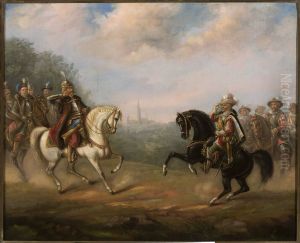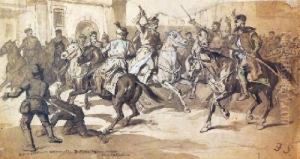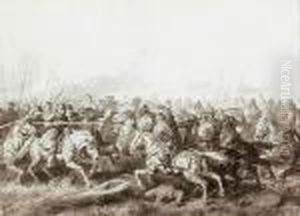Feliks Sypniewski Paintings
Feliks Sypniewski was a Polish artist renowned for his meticulous engravings and lithographs, capturing the essence of Polish culture, history, and the natural world. Born on October 13, 1830, in Płonne, Congress Poland, within the Russian Empire, Sypniewski grew up during a period of intense cultural and political changes. His early life was marked by the November Uprising of 1830-1831, an event that would later influence his artistic themes.
Sypniewski's education in art began at the Warsaw School of Drawing, followed by further studies at the Academy of Fine Arts in St. Petersburg, Russia. His time in St. Petersburg was pivotal, exposing him to a wide array of artistic techniques and philosophies. Despite the academic environment, Sypniewski remained deeply influenced by Polish artistic traditions and the Romantic movement, which celebrated national identity, history, and the natural landscape.
Throughout his career, Sypniewski became known for his detailed and evocative engravings that often depicted historical scenes, legends, and landscapes. His works were not only artistic but also served as a form of cultural preservation, documenting traditional Polish costumes, architecture, and folk customs at a time when Poland's national identity was under threat due to the partitions of Poland by neighboring empires.
Sypniewski's contribution to Polish art was significant, not only for his skill as an engraver but also for his role in the Romantic movement in Poland. He was a contemporary of other Polish Romantic artists and intellectuals who sought to keep Polish culture alive through their work. Despite the challenges of working under foreign domination, Sypniewski's art resonated with the Polish people and contributed to the national revival movements of the 19th century.
Feliks Sypniewski passed away on April 13, 1897, in Krakow, leaving behind a legacy of art that continues to inspire and inform. His works are preserved in various collections and museums, serving as a testament to his dedication to Polish culture and his mastery of the engraver's craft. Sypniewski's life and work remain an important part of Polish art history, symbolizing the resilience of Polish culture and the power of art to preserve national identity.
















